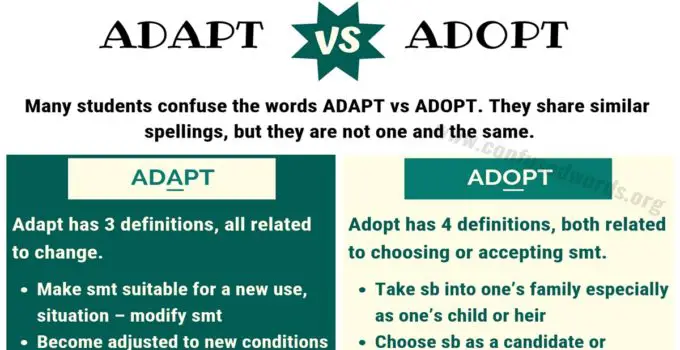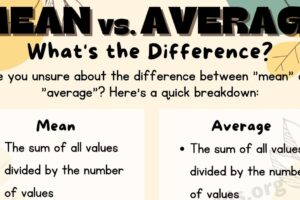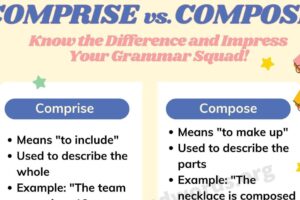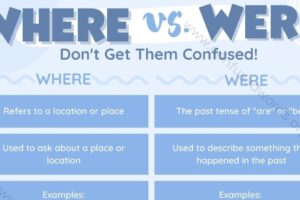Adapt vs. adopt!!! When it comes to language, words can often have similar meanings that can be easily confused. One such pair of words is adapt and adopt. Though they may sound similar, they have distinct meanings that are important to understand in order to use them correctly. In this article, we will explore the differences between adapt vs. adopt and provide examples of when to use each word.
Contents
Adapt vs. Adopt
Definition of Adapt
Adapt is a verb that means to modify or change something to make it suitable for a new purpose or a new situation. It can also refer to adjusting oneself to a new circumstance. Adapt can be used as a transitive verb, where it takes an object, or as an intransitive verb, where it does not take an object.
Definition of Adopt
Adopt is a verb that means to take something over, to choose, accept, or approve of something by choice. It can also mean “to legally raise a child as one’s own.” Adopt always takes an object.
Key Differences between Adapt and Adopt
The following are the key differences between adapt vs. adopt:
- Adapt modifies something to make it suitable for a new purpose or situation, while adopt takes something over or chooses something by choice.
- Adapt can be used as a transitive or intransitive verb, while adopt is always a transitive verb.
- Adapt refers to modifying something, while adopt refers to taking something over.
- Adapt can refer to adjusting oneself to a new situation, while adopt does not have this meaning.
In summary, adapt and adopt are two verbs that sound similar but have completely different meanings. While Adapt refers to modifying something to make it suitable for a new purpose or situation, Adopt refers to taking something over or choosing something by choice.
When to Use Adapting vs. Adopting
When it comes to choosing between adapting and adopting, it can be challenging to know which one to use. In this section, we’ll explore some of the particular use cases and English language usage to help you decide which one is most suitable for your needs.
Particular Use Cases
Adapting is often used when there is a need to modify something to make it more suitable for a particular purpose or condition. For instance, if we are moving to a new city, we might need to adapt to the new environment, culture, or weather. In contrast, adopting is used when we take over or choose something that is already available or existing. For example, we can adopt a new policy, practice, or approach.
In some cases, we might need to use both adapting and adopting. For instance, when we are implementing a new policy in a different environment, we might need to adapt the policy to suit the new conditions and then adopt it as our own.
English Language Usage
In the English language, adapt is a transitive verb, which means it needs an object to complete its meaning. For instance, we can say “We need to adapt our strategy to the new market conditions.” In contrast, adopt can be both transitive and intransitive. For example, we can say “We need to adopt a new approach” or “We need to adopt to the new conditions.”
It’s worth noting that adapt is often used in the context of modification or change, while adopt is often used in the context of choice or acceptance. Therefore, when we want to emphasize the idea of modification or change, we might use adapt, and when we want to emphasize the idea of choice or acceptance, we might use adopt.
In conclusion, the choice between adapting and adopting depends on the particular use case and the English language usage. By understanding the differences between the two, we can use them effectively to communicate our ideas and intentions.
Conclusion:
In conclusion, knowing the difference between adapt vs. adopt is important in effectively communicating our ideas and intentions. While the two words may seem similar, they have distinct meanings that should not be interchanged.
When we “adapt” something, we modify it to make it more suitable for a certain purpose or situation. For example, we may adapt a product to make it easier to use or adapt our behavior to fit in with a new culture when traveling to another country.
On the other hand, when we “adopt” something, we take it over and formally accept it as our own. This can include adopting a child into our family or adopting a new law or custom.
It is important to note that “adopt” can also be used in a less formal sense to mean simply choosing or accepting something, while “adapt” is typically used in the context of modification or adjustment.
In summary, understanding the difference between adapt vs. adopt can help us communicate our intentions more clearly and effectively, whether we are discussing product development, family matters, or formal policies in law or film.
Frequently Asked Questions
What is the difference between “adapt” and “adopt”?
“Adapt” refers to the process of adjusting to new circumstances or conditions, while “adopt” refers to the act of taking something as one’s own or making it a part of one’s life.
Can you give an example of using “adapt” in a sentence?
Sure!
- “I had to adapt to the new work environment after my company moved to a different location.”
How about an example of using “adopt” in a sentence?
Of course!
- “After trying out several different diets, I decided to adopt a vegan lifestyle.”
Is it possible to use “adapt” and “adopt” interchangeably?
No, they have distinct meanings and cannot be used interchangeably.
When should I use adapt vs. adopt in my writing?
You should use “adapt” when referring to adjusting to new circumstances or conditions, and “adopt” when referring to taking something as one’s own or making it a part of one’s life. It’s important to use the correct word to convey your intended meaning accurately.
Difference between Adapt vs. Adopt | Infographic
Difference between Adapt vs. Adopt
Related resources:
- Advice vs. Advise
- Breath vs. Breathe
- Compliment vs. Complement
- Affect vs. Effect
- Lose vs. Loose
- Emigrate vs. Immigrate
- Chose vs. Choose
- Lay vs. Lie
- Attain vs. Obtain
- Invoke vs. Evoke
- Accept vs. Except






